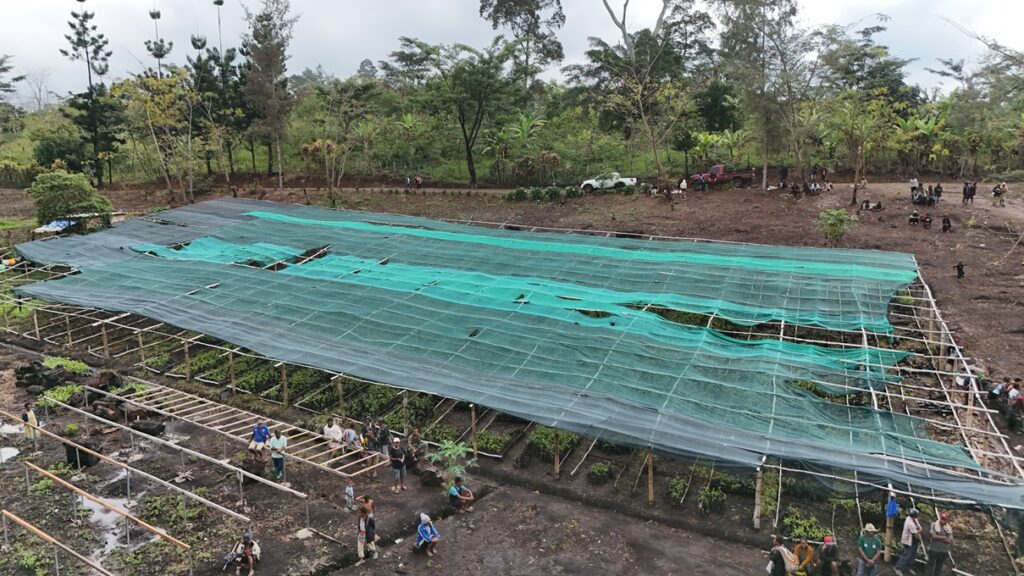Goroka, Eastern Highlands | Friday, May 16, 2025 — The long-neglected plantation coffee sector in the Eastern Highlands is being revitalised through a K1 million investment in Jaygoss Coffee Ltd, funded by the Government of Papua New Guinea through the Coffee Industry Corporation Ltd (CICL) – Papua New Guinea Agriculture Commercialisation and Diversification (PACD) Project, with technical and financial support from the World Bank.
Jaygoss Coffee Ltd, in partnership with the PACD Project, officially opened a new coffee storage shed at Ipagu Plantation in Goroka on Friday, May 16, 2025.
The event brought together officials from the World Bank, PACD Project, CICL, national government departments, and the Eastern Highlands Provincial Government, alongside coffee farmers from the Ipagu, Gomena, and Joiparoroka plantations and members of the Kama, Ufeto, Nagamiufa, and Lapeigu tribes.
Jaygoss Coffee Lead Partner, Mr Nathan Gomae, said the investment was not just about infrastructure but about restoring hope to long-neglected coffee-growing communities.
“This is more than a shed. It is a new beginning for farmers who’ve waited over 35 years to be properly supported,” Mr Gomae said. “With the right model and transparent implementation, we can turn rural hardship into opportunity.”
He thanked PACD Project Manager Mr Potaisa Hombunaka, CICL CEO Mr Charles Dambui, the Government of Papua New Guinea, and the World Bank for their belief in the plantation sector.
“We hope this partnership continues beyond 2025. From Ialibu-Pangia to Jiwaka, Chimbu, Eastern Highlands, and Morobe — the PACD model is working. It’s time we scale this success.”

Funding Breakdown and Project Delivery
The K1 million in PACD support was released in tranches under strict implementation guidelines:
- K50,000 – Office setup and staff recruitment
- K134,000 – Nursery development
- K334,000 – Warehouse, wet mill, solar dryer (75% complete), equipment and tools
Jaygoss Coffee has also constructed a 75,000-tree nursery and employed 20 local tradesmen, including carpenters, bricklayers, and welders.
Productivity and Income Potential
With 100 hectares across three plantations, Jaygoss Coffee estimates an annual green bean production capacity of 150 tonnes. At the current market rate of K24 per kg, this equates to an estimated K3.6 million in potential revenue.
Of this, K2.7 million (75%) is returned directly to farmers, with the remainder retained by Jaygoss Coffee to cover labour, inputs, transport, and other operational costs.

“This is the opposite of the old model,” Mr Gomae said. “In the past, plantation owners kept 75% and gave only 25% to workers. Now, our farmers are earning K3 per kg for cherry and K13 per kg for parchment. That’s never happened before.”
Impact and Community Empowerment
Over the past 17 months, Jaygoss Coffee has delivered training to over 150 blockholders and surrounding smallholder farmers on:
- Coffee Berry Borer (CBB) management
- Participatory Rural Appraisal Process (PRAP)
- Coffee husbandry practices
- Coffee quality improvements
Upcoming modules will focus on financial management, personal viability, HIV/AIDS awareness, and gender equality — ensuring inclusive, sustainable development within farming communities.
“We’re not just building facilities — we’re building people,” Mr Gomae added. “The ripple effects are being felt in Gomena, Kama, and beyond. Local SMEs are thriving, and young people are finding full-time employment in coffee.”

Challenges and the Road Ahead
While acknowledging that 2026 may be a challenging year as newly planted seedlings mature, Mr Gomae said the company is actively raising internal revenue through current sales to sustain operations.
Despite past setbacks — including ageing trees, falling prices, cherry theft, transport difficulties, and pest infestations — Jaygoss Coffee has reversed its decline, producing 9,000kg of green bean so far this year, generating K216,000 in revenue, 75% of which has already gone directly to farmers.
Export Ambition
Jaygoss Coffee is now working to become a registered exporter of single-origin, organic Arabica coffee.
Mr Gomae highlighted the imbalance in the sector: “Papua New Guineans grow 100% of our coffee, yet only 20% is exported by PNG-owned firms. The rest is exported by foreign-owned companies that don’t cultivate a single hectare.
“This is not fair. But we are ready to change that by taking on the challenges of marketing, quality control, and compliance to meet global buyer requirements.”
###